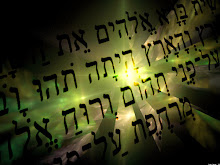The Religious Act: Asking the Question
The lesson of truth is not held in one consciousness. It explodes toward the other. To study well, to read well, to listen well, is already to speak: whether by asking questions and, in so doing, touching the master who teaches you, or by teaching a third party.”
--Emmanuel Levinas “Beyond the Verse: Talmudic Readings and Lectures” (1994)
Saturday, September 12, 2009
Characteristics of YHWH
My reading of Gunn and Fewell and the changing characters that can be found in a biblical narrative forced me to think critically about how "on the surface" I have read and even studied many a story in the Bible. Reading the bible in this way, I now realized, has made me to view God and his work in the world as always aiming for goodness. However, in reading the text, I was able to see how God, uses disasters and other situations in our lives as a means of bringing us in line with his will. How often in reading the stories that as Christians we allow ourselves to focus on the sad part of the stories without seeing how YHWH used these situations for his own purpose. In the story of Joseph, instead of looking on the horrific way in which the brothers treated Joseph, the authors suggest that the reader look at how YHWH used this situation as a way to cultivate in the brothers, and to us, an understanding of YHWH's power of salvation and redemption (p. 83). In the story of Ruth and Naomi, YHWH displays serveral characteristics - punisher, provider and savior. In the story Naomi loses her husband and sons and is mourning which might be seen as punishment for going to Moab in the first place but YHWH does not just through her to the wolves. Provision is made for her through the love and compassion that YHWh puts in the heart of her daughter-in-law Ruth who returns to Bethlehem with her. Inspite of being a foreigner in the land, Ruth who is not used to worshipping YHWH learns by the example of Naomi and is willing to learn how to worship YHWH and pledges that not even death will come between her and her mother-in-law. Finally, Ruth encounters Boaz by which YHWH shows his characteristic as savior.
My take-away from the assigned chapters in Narrative in the Hebrew Bible, forced me to recognize the importance of accepting YHWH's as complex, multi-faceted and challenging. Recognizing that all stories, even biblical one, are laiden with plots and twists with the characters in the story motivated by one or more things is a great way to look forward to what comes next in this interesting text.
Friday, September 11, 2009
CHARACTER OF YHWH
The stories of the Hebrew Bible shows YHWH as a mysterious God and the author warns of the propensity of characters to shift in and out of focus(p76). At times in the bible YHWH has a single trait and is considered predictable(flat character) and at times He displays a multiple of traits, even contradictory behaviors(p75). This lends to that mysterious persona because the authors of the Biblical Stories did n't truly understand, why God reacted in certain circumstances, why God does things the way He does. At times he was a God of mercy, of retribution, a God that gives, a God that takes away, a God that is present, and a God missing in action. All of these characterizations are clues, that helps the reader to draw a picture of God, even though it maybe an imperfect picture. It underlines the complexity of our relationship with God, and I believe the authors infers that we have made it more complex than it should be.
Tuesday, September 8, 2009
Reading Ethically
When reading the Bible, people can and will put there own interpretation on the passages they are reading. They will relate to those passages based on their life experiences. The two examples used in the text: the Czech Jews and the Bible class, shows that if you read the Bible "as if" your life depended on it, you might be a more critical reader of the Bible. As stated in the text, "competent reading has to di with more than the application of knowledge because the stakes can be high - with consequences for life and limb".
As much as we try to take into account the time and context in which the Scriptures in the Bible were written, I believe that we must look at 2 Peter 1: 20-21: "Above all, you must understand that no prophecy of Scripture came about by the prophet's own interpretation. For prophecy never had its origin in the will of man, but men spoke from God as they were carried along by the Holy Spirit" When reading the Bible, we must remember that it is inspired by God and it is through the Holy Spirit that we can truly understand the Scriptures. When we put our own personal "spins" on the Bible, are we truly getting the meaning that God wants us to get from his Words?
The woman stated that Matthew 5:38-39, "has killed more women than any of us here would care to count". It wasn't those Scriptures that killed women, it was the interpretation that could have gotten the women killed. So when we ethically read the Bible, we should do it with the help of the Holy Spirit.
Enuma Elish On-Line
Class: here is the link to the Enuma Elish for this evening's class. Click on Enuma Elish On-line and you will go right to the link. We will use this in class this evening.
Subscribe to:
Posts (Atom)
